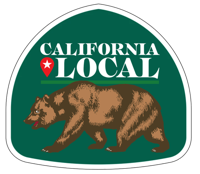
Our ownership, funding, ethics and editorial policies.
California Local is a proud tax-paying California C Corporation owned by local Californians, Chris Neklason of Santa Cruz and Eric Johnson of Sacramento.
Our journalism is funded by our members and local underwriters, the sale of advertising, and the contracting of editorial and publication services and partner content.
The First Amendment gives journalists responsibilities unlike those in any other field of work. California Local’s reporters and editors adhere to the Code of Ethics, written, revised and circulated by what is now the Society of Professional Journalists since 1926.
Society of Professional Journalists
CODE OF ETHICS
PREAMBLE
Members of the Society of Professional Journalists believe that public enlightenment is the forerunner of justice and the foundation of democracy. Ethical journalism strives to ensure the free exchange of information that is accurate, fair and thorough. An ethical journalist acts with integrity. The Society declares these four principles as the foundation of ethical journalism and encourages their use in its practice by all people in all media.
Seek Truth and Report It
Ethical journalism should be accurate and fair. Journalists should be honest and courageous in gathering, reporting and interpreting information.Journalists should:
– Take responsibility for the accuracy of their work. Verify information before releasing it. Use original sources whenever possible.Minimize Harm
Ethical journalism treats sources, subjects, colleagues and members of the public as human beings deserving of respect.Journalists should:
– Balance the public’s need for information against potential harm or discomfort. Pursuit of the news is not a license for arrogance or undue intrusiveness.Act Independently
The highest and primary obligation of ethical journalism is to serve the public.Journalists should:
– Avoid conflicts of interest, real or perceived. Disclose unavoidable conflicts.Be Accountable and Transparent
Ethical journalism means taking responsibility for one’s work and explaining one’s decisions to the public.Journalists should:
– Explain ethical choices and processes to audiences. Encourage a civil dialogue with the public about journalistic practices, coverage and news content.The SPJ Code of Ethics is a statement of abiding principles supported by additional explanations and position papers that address changing journalistic practices. It is not a set of rules, rather a guide that encourages all who engage in journalism to take responsibility for the information they provide, regardless of medium. The code should be read as a whole; individual principles should not be taken out of context. It is not, nor can it be under the First Amendment, legally enforceable.
Sigma Delta Chi's first Code of Ethics was borrowed from the American Society of Newspaper Editors in 1926. In 1973, Sigma Delta Chi wrote its own code, which was revised in 1984 and 1987. In 1988, the organization changed its name to the Society of Professional Journalists. The Code was again updated in 1996 and 2014.
The original news published on California Local is reported and written by professional journalists with a commitment to fairness and accuracy. The writers are aware that they are responsible for ensuring that anything stated as fact has been verified.
California Local follows journalistic rules of attribution. In cases where our writers present information aggregated from trusted news sources, we link directly to those sources.Every article presented as news in California Local has been vetted by an editor with years of experience. Same goes for every profile of an elected official or description of a nonprofit community group.
The news that we distribute from our partners in the California Local Media Alliance has been similarly vetted by the journalists in the newsrooms of those media organizations.
Every serious news organization makes an extraordinary effort to ensure that everything they publish is factually correct. And still, we all make mistakes.
When we find a mistake in anything on California Local, whether it’s a carefully researched News & Analysis piece, a short listing in one of our directories, or an event, we take immediate steps to fix it.
In some cases, for example a news article, we will note on the appropriate page that a correction was made. In some circumstances, we also include an editor’s note explaining how or why the error happened.
Occasionally, an article might get something wrong without misstating any facts. If we conclude that an article reasonably can be seen to have created a wrong impression, through choices of context or tone, we will publish a clarification.
California Local is committed to providing reliable news and information that is carefully vetted for accuracy, professionally edited and fun to read—for free.
To help pay for this, we are partnering with organizations and agencies whose work we support, and helping them tell their stories. As one of the services we provide for our strategic partners, we write articles about things they're doing that we believe will be of interest to our community.
In the interest of transparency and full disclosure, we label all such articles as Partner Content. We want you to know that we are just as careful with this content as we can be, and in every case we stand by what we publish.